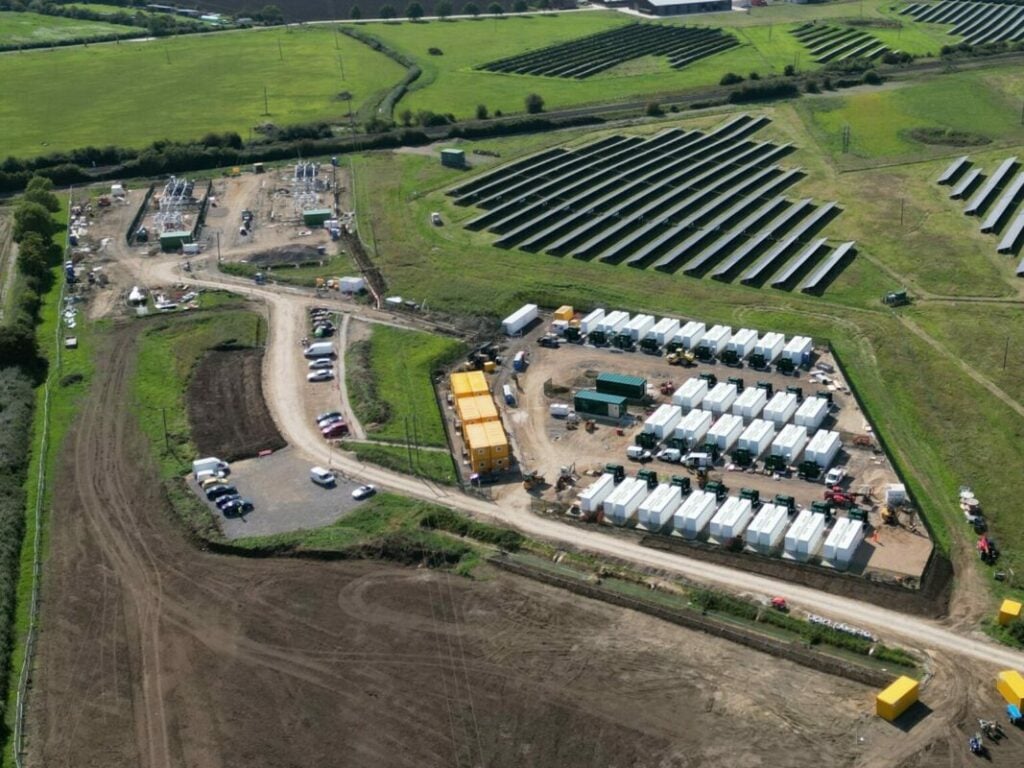
The UK’s battery storage industry has grown rapidly, but more must be done for the technology to make a vital contribution to net zero targets, writes Peter Kavanagh, CEO of UK BESS developer Harmony Energy.
The UK was the birthplace of coal power, and now, over 140 years later, it’s the first major economy to give it up, marking a significant milestone in the nation’s journey towards a sustainable energy future.
Enjoy 12 months of exclusive analysis
- Regular insight and analysis of the industry’s biggest developments
- In-depth interviews with the industry’s leading figures
- Annual digital subscription to the PV Tech Power journal
- Discounts on Solar Media’s portfolio of events, in-person and virtual
With UK electricity no longer produced from burning coal, it’s time to focus on a future built on generating renewable energy from sources such as wind and solar. But given the intermittent nature of these sources, how can the UK lead the way in the energy transition? The answer: battery energy storage systems (BESS).
Where we are today
Following the hottest year on record and the wettest 18 months in England since records began, it’s clear that decisive and difficult decisions need to be made in the face of a climate emergency. The UK has close to 5GW of operational BESS sites, including over 600MW of BESS operational in Harmony Energy’s portfolio across 17 UK sites. However, there’s still much more to be done to help the UK move away from fossil fuels to clean energy.
Local benefits must be emphasised alongside decarbonisation
BESS provides multiple services to support grid stability but also allows us to store excess electricity and release it when the grid needs it most. After a turbulent period in energy markets, the importance of energy security and reducing reliance on foreign imports has never been more important.
Without the growth of BESS and renewable energy (such as solar and wind), the nation will struggle to produce its own energy and will continue to rely on imports. Expanding BESS capacity can help mitigate uncertainties and, ultimately, help reduce energy bills.
While BESS projects offer significant national and global benefits, it’s equally important to support the local communities around these sites. Initiatives such as biodiversity enhancements, community funds, charity and event sponsorships, and other opportunities introduced by developers can help communities thrive alongside projects.
The challenges the BESS industry faces
Projects like ours are largely built without government subsidies or taxpayers’ money. It is essential for them to be built in close proximity to substations, which in turn reduces the costs and therefore, makes the site financially viable. It also has the added advantage of keeping energy infrastructure grouped together without impacting the wider landscape.
In any industry, the deployment of newer technology may cause concerns from the public and local authorities. Ensuring the safety of BESS projects must be a top priority, and with the industry having over 140 UK BESS sites operating safely and thousands live across the globe, it’s essential developers and operators continue to build trust with communities.
From the outset, we’ve been committed to ensuring the security of both our operational teams and the surrounding communities through maintaining high standards of health and safety. This effort is backed by cutting-edge technology, skilled specialists, strict adherence to regulations and the availability of comprehensive safety guidelines.
Making yourself visible to addressing concerns is key to the progression of the industry. Events such as public consultations, community engagement opportunities, site tours, and accessible means of contact, provide an opportunity throughout the planning process to demonstrate the stringent safety measures, explaining the reasons behind site locations, and clarifying decision-making made when implementing new developments.
Addressing operational inefficiencies
A pressing issue the industry is facing is the operational inefficiencies within the UK’s electricity system. BESS operators often face the frustration of seeing batteries skipped in the Balancing Mechanism (a major source of revenue for BESS) in favour of more expensive and less efficient gas-fired power stations. The Electricity System Operator (ESO) has acknowledged this issue, attributing it to ageing IT systems. They are implementing multiple upgrades in full acknowledgment of the benefits BESS bring to improve the energy system’s overall efficiency, energy security and reducing consumer energy bills.
Looking ahead to Net Zero
The future of BESS in the UK is both promising and challenging. According to projections from National Grid, we need to increase our current storage capacity tenfold within the next six to ten years to meet the growing demand. This expansion is essential to make the energy system efficient and capable of supporting the government’s ambitious target to decarbonise the electricity system by 2030.
Despite the challenges, there is strong demand and support for BESS. As we continue to develop and deploy advanced storage solutions, we must also advocate for more streamlined planning processes and grid enhancements to support this critical infrastructure. The path to net zero is not without its obstacles, but we are encouraged to see Energy Minister Ed Miliband tackling these issues head-on.
BESS is not just a complementary technology to renewable energy, it is an essential component of the nation’s net zero strategy. At Harmony, we are dedicated to advancing this technology and ensuring its safe, planned with our communities in mind, and we are advocating for better planning processes, to help the UK expand our storage capacity. Together, we can pave the way to powering a more sustainable future.
About the author
Peter Kavanagh is the CEO of Harmony Energy, a UK developer of battery storage projects. Kavanagh co-founded Harmony Energy having spent ten years in finance. He has over 16 years’ experience working across the renewable energy sector, in financing and development.

